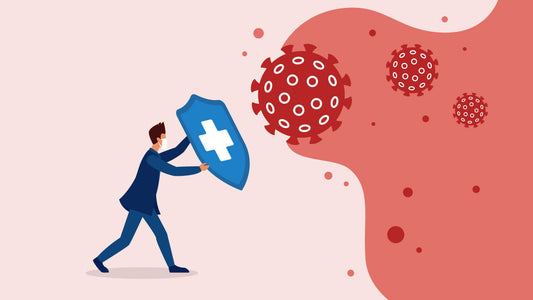If you’re wondering how you can boost your immune system to fight infections and kick away the common cold, there’s no shortage of natural options.
The immune system is by no means simple, and there’s no single and straightforward way to best support it. It comes with a list of influencing factors that can alter immune system responses, such as stress, sleep, exercise, diet, smoking, alcohol consumption, and more.
And while practicing good lifestyle habits like getting adequate sleep, getting out in the sun, managing stress levels, and moving daily are all important for maintaining immune function, what you put (and don’t) put into your mouth also plays a huge role.
What Weakens The Immune System?
When it comes to supporting the immune system, lifestyle factors have a huge influence. Here’s a rundown of some of the heaviest hitters that can impair immune defenses and increase susceptibility to illness and infection:
1. Poor Nutrition
Like every other system in the body, the immune system requires a delicate balance of nutrients to support optimal function, and when you’re eating a diet high in processed foods and low in nutrients, it doesn’t have what it needs.
Things like vitamin D, zinc, vitamin C, and selenium all play an important role in supporting both the innate and adaptive responses of the immune system 1. Deficiencies in any of these key nutrients causes defects in various aspects of immune responses.
2. Lack Of Sleep
Ever noticed that when you don’t get enough sleep, things like muscle aches, runny noses, coughs, and the like start to creep up?
And then when you’re sick, your body just craves sleep? Sleep and immune function are intricately connected and have a bidirectional relationship where one affects the other.
Several studies show that sleep loss can impact different parts of the immune system, which can lead to the development of a wide variety of diseases.
Sleep loss reduces natural killer (NK) cell activity, which increases susceptibility to viral infections; it generates production of inflammatory cytokines, which increases the risk of cardiovascular and metabolic diseases; and reduces production of antibodies, which increases the risk of infections 2.
One study found that restricting sleep to just 4 hours for one night reduced NK cell activity by 72% 3. But that’s not it. It also led to an increase in the production of inflammatory cytokines, which are key for maintaining cardiovascular and metabolic health 4. For optimal function and immune health, you should be getting 7-9 hours of good quality, uninterrupted sleep every night.
3. Excessive Stress
Stress is massive for the immune system. While acute stress can be beneficial for strengthening immune responses, chronic stress can be hugely detrimental.
There’s a well-established relationship between the CNS, endocrine, and immune systems where stress causes immune dysregulation across several areas of the humoral and cellular immune responses 5.
One of the major reasons stress causes such an impact is because of the release of stress hormones that are triggered with stress.
Under normal circumstances, cortisol is an anti-inflammatory compound, but when chronically elevated due to chronic stress, it can result in the immune system becoming “resistant,” accumulation of stress hormones, and increased production of inflammatory cytokines that further compromise immune responses 6.
4. Sedentary Lifestyle
Although the mechanisms linking exercise and immune function aren’t entirely clear, studies show that regular moderate-intensity activity can enhance immunosurveillance by increasing antipathogen activity of tissue macrophages, along with other immune cells, including immunoglobulins, anti-inflammatory cytokines, neutrophils, NK cells, cytotoxic T cells, and immature B cells, all of which play important roles in immune defense activity and metabolic health.
Long-term, these transient increases in selective immune cells work to enhance immunosurveillance and reduce levels of inflammation, thereby promoting a better immune response and better overall health 2.
5. Poor Lifestyle Choices
Aside from lifestyle factors like sleep, stress, diet, and exercise, we also have things like alcohol consumption, smoking, antibiotic use, and the like that all contribute to the health of our gut, immune function, and overall state of health.
Research suggests that all three contribute to alterations in gut microbiota in different ways. Smoking, specifically, has been shown to change intestinal irrigation and microbiome balance, increase the permeability of the mucosa, and impair mucosal immune responses 7. The more we engage in lifestyle choices that interfere with gut health, the harder our immune system is hit.
Top Nutrients For Immune Function
We’re not going to run through the in-depth roles of all of these nutrients in immune function, but it’s important to know the key players when you’re looking at foods that support the immune system.
Loading up on foods rich in these vitamins and minerals gives your immune system the foundation it needs to support strong responses during times of stress, sleep deprivation, sickness, and other situations where immune function can be impaired.
- Zinc: Zinc is an immune-supporting superstar. It’s required for proper immune cell development, communication, and plays a key role in the inflammatory response, along with providing a protective function to the tissue barriers in the body that prevent infiltration of external pathogens 8.
- Selenium: Because of its role in forming selenoproteins, selenium plays a major part in modulating levels of inflammation, oxidative stress, and other cellular processes in virtually all body tissues and cell types, including immune cells 9.
- Glutamine: Glutamine is an essential amino acid that’s considered a significant fuel source for immune cells. It’s a nutrient required for lymphocyte proliferation and cytokine production, macrophage phagocytic plus secretory activities, and neutrophil bacterial killing 10. Although glucose is the preferred fuel source for most cells, immune cells utilize glutamine at high rates under catabolic conditions (sepsis, recovery from burns/surgery, malnutrition, high intensity or volume exercise).
- Vitamin D: As the vitamin D receptor is expressed on most cell types, vitamin D plays an important role in supporting the function of both the innate (immediate) and adaptive (long-term) branches of the immune system. It is required for the function of various immune cells, including monocytes and macrophages, as well as modulating levels of inflammation 8, 11.
- Vitamin C: The classic for immune health, vitamin C supports epithelial barrier function, and antioxidant and oxidant scavenging activity of the skin to protect the body against environmental oxidative stress, along with playing a part in the “cellular clean-up crew” that rids the body of damaged and worn-out cells, and replaces them with new, functional ones 12.
10 Foods For Better Immunity
So, what should you load your plate with for better immune function?
- Citrus: Oranges, grapefruits, lemons, limes, and other citrus fruits are staples for supporting the immune system. They’re a concentrated source of vitamin C and folate, both of which have important roles in sustaining the integrity of immunological barriers, and in supporting the function of several types of immune cell (phagocytes, natural killer (NK) cells, T-cells, and B-cells) 13. Citrus fruits also contain bioactive polyphenols like hesperidin, narirutin, and naringin that all exhibit anti-inflammatory effects.
- Pumpkin seeds: They may be small, but they pack a mighty punch where minerals are concerned. Pumpkin seeds are a concentrated source of zinc with just one ounce (28g) containing approximately 14% of the RDI 14. They’re also loaded with antioxidants like carotenoids and vitamin E.
- Oysters: If there’s one food known for high concentrations of zinc, it’s oysters. Just a 3.5 ounce (100g) serving of oysters offers a whopping 61mg of zinc 15.
- Cold-water fatty fish: Oily fish like salmon, sardines, mackerel, herring, and anchovies are concentrated sources of omega-3 fatty acids that are key for tampering down inflammation and supporting appropriate immune responses. They’re also a rich source of vitamin D and selenium.
- Garlic: Garlic has been used for centuries as a powerful immune-supporting compound. It’s known to have antiseptic, antibacterial, and antifungal properties, along with being an immunomodulatory and anti-inflammatory compound. Studies show that garlic can enhance the function of the immune system by stimulating certain types of cells, including macrophages, lymphocytes, natural killer (NK) cells, dendritic cells, and eosinophils 16.
- Broccoli: This crunchy cruciferous veggie is loaded with vitamin C and beta-carotene, along with sulfur compounds that may boost the production of glutathione, the body’s main and most powerful endogenous antioxidant that works to attack free radicals and minimize their potential to damage other cells 17.
- Eggs: Protein is an important component of proper immune responses, and while eggs don’t contain as much as other animal-based (or some plant-based) sources, it contains several other nutrients like vitamin D, zinc, selenium, and vitamin E that are required for immune function.
- Beef: Surprised to find this one on this list? Beef, especially grass-fed, is loaded with key nutrients that support immune responses, including amino acids, zinc, selenium, vitamin B6, and vitamin B12. A deficiency in some of these nutrients impairs immune responses and increases susceptibility to illness and infection. Whether it’s ground beef, steak, roasts, or stew beef, look for delicious ways to incorporate it into your diet!
- Fermented foods: Kimchi sauerkraut, tempeh, kefir, and other fermented foods are loaded with probiotic bacteria that help to support a balanced and healthy microbiome. Because so much of the immune system stems from the gut, having microbial diversity is important for healthy and balanced immune responses.
- Brazil nuts: Brazil nuts are another immune-boosting food because of their high concentrations of the trace mineral selenium. Just a few Brazil nuts daily can fulfill your daily requirement for selenium, with each nut providing about 68–91mcg of selenium 18.
BONUS: Performance Lab Immune

We know this one isn’t a food, but if you’re looking to complement a healthy diet with a powerful natural immune-boosting supplement, this right here is it.
Immune offers the most dynamic immune support on the market by combining six powerful ingredients designed to maximize your natural immune defenses.
Immune is a breakthrough immune-boosting probiotic and antioxidant stack that supports both short and long-range immune activities by activating five different types of immune cells to quickly restore frontline defenses and support your body’s natural immune function. In each capsule, you’re getting:
- 20mcg NutriGenesis® Vitamin D
- 30mg NutriGenesis® Vitamin C
- 25mcg NutriGenesis® Selenium
- 5mg NutriGenesis® Zinc
- 50mg IMMUSE™ Paraprobiotic
- 250mg Setria® Glutathione
Designed for maximum performance, Immune delivers true broad-range supporting by:
- Fortifying first-line immune defenses and long-range immune responses
- Increasing numbers and activities of various immune cells
- Maintaining work productivity and performance by supporting overall immune wellness
- Replenishing antioxidant status to boost and support immune system offense and defense
- Fighting immune challenges and fatigue associated with stress
- Restoring foundational immune support with NutriGenesis® vitamin and mineral complex
Whatever immune challenge life throws at you—whether it’s stress, poor nutrition, intense exercise, or an illness—Immune has you covered. It helps you recover faster and bounce back stronger.
References
- CE Childs, PC Calder, EA Diet and Immune Function.Nutrients. 2019;11(8):1933.
- https://www.cdc.gov/niosh/work-hour-training-for-nurses/longhours/mod2/06.html
- MR Irwin, A Mascovich, JC Gillin, R Willoughby, J Pike, TL Smith. Partial sleep deprivation reduces natural killer cell activity in humans. Psychosom Med. 1994; 56(6):493-498.
- MR Irwin, M Wang, CO Campomayor, A Collado-Hidalgo, S Cole. Sleep deprivation and activation of morning levels of cellular and genomic markers of inflammation. Arch Intern Med. 2006; 166(16):1756-1762.
- R Glaser, J Kiecolt-Glaser. How stress damages immune system and health. Discov Med. 2005;5(26):165-169.
- JN Morey, IA Boggero, AB Scott, SC Segerstrom. Current Directions in Stress and Human Immune Function. Curr Opin Psychol. 2015;5:13-17.
- X Gui, Z Yang, MD Li. Effect of Cigarette Smoke on Gut Microbiota: State of Knowledge. Physiol. 2021.
- M Di Rosa, M Malaguarnera, F Nicoletti, L Vitamin D3: a helpful immuno-modulator. Immunology. 2011;134(2):123-139.
- PR Hoffmann, MJ Berry. The influence of selenium on immune responses.Mol Nutr Food Res. 2008;52(11):1273-1280.
- V Cruzat, M Macedo Rogero, K Noel Keane, R Curi, P Newsholme. Glutamine: Metabolism and Immune Function, Supplementation and Clinical Translation. 2018;10(11):1564.
- DD Bikle. Vitamin D and immune function: understanding common pathways.Curr Osteoporos Rep. 2009;7(2):58-63.
- AC Carr, S Vitamin C and Immune Function.Nutrients. 2017;9(11):1211.
- EA Miles, PC Calder. Effects of Citrus Fruit Juices and Their Bioactive Components on Inflammation and Immunity: A Narrative Review. Immunol. 2021; 12:712608
- https://nutritiondata.self.com/facts/nut-and-seed-products/3066/2
- https://fdc.nal.usda.gov/fdc-app.html#/food-details/175171/nutrients
- R Arreola, S Quintero-Fabián, RI López-Roa, et al. Immunomodulation and anti-inflammatory effects of garlic compounds. J Immunol Res. 2015;2015:401630.
- DM Minich, BI Brown. A Review of Dietary (Phyto)Nutrients for Glutathione Support. 2019;11(9):2073.
- https://ods.od.nih.gov/factsheets/Selenium-Consumer/














